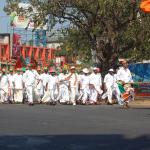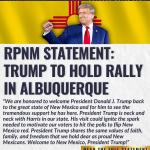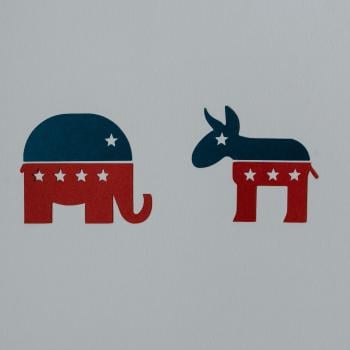In these turbulent times, we can often feel overloaded with information. There are so many voices to choose from. Each year, the list of fact checking nonprofits grow. And for every headline touting the talking points of one side, there are ten more headlines towing the party line of the other. Amidst so much misinformation, where can truth be found in this oversaturated marketplace of ideas?
Misinformation and the Internet
Recently, a video was posted by the Herald Diary on Threads showing violent explosions. The cameraman looked on as buildings appeared to go up in flames. Sparks shot up into the night sky. Men on foot were running for safety out of the camera frame. Vehicles in choked city streets struggled to drive away from the carnage.
The caption read “Beirut, Lebanon, during the early hours of Sunday morning:”
Post by @theheralddiaryView on Threads
Some time earlier, the very same video was posted to social media, this time with a different caption. “Videos circulating on Israeli Telegram groups show the effects of the Iranian strikes on Israel.”

Was the video taken in Israel, or in Lebanon? Were the explosions caused by the IDF, or by Hezbollah? As it turns out, neither.
The original video was in fact taken from a gas station explosion in Yemen, posted August 31, 2024 to YouTube. We find yet another example of misinformation on the web.
Broad-based statistics released by GWI, an “audience targeting company for the global marketing industry” show that as of 2024, the average user spends 2 hours and 23 minutes a day on social media platforms. This figure climbs the younger users get. Users aged 16 to 24 are on social media for nearly three hours a day. This isn’t a complaint. It’s a serious observation.
Information Oversaturation
If we tracked our own daily usage, we could be above this global average. The point isn’t the time that we spend on social media, though. What matters is the sheer volume of information that we take in through media. This includes audio-visual platforms like YouTube, thread-based platforms like Threads or X, and short-form platforms like TikTok.
Talking heads enjoy attention on all these platforms. And not all voices are equally reliable. There are self-proclaimed prophets, activists, gurus, health nuts, pop scholars, public intellectuals, and political pundits.
And the amount of “content” that they create does not leave us with time enough to consume it all. Nor, more importantly, with time enough to discern the truth in all the information and misinformation.
The Privilege of Misinformation
We pause here to appreciate the fact that we do have so much freedom of the press. For news, we do not need to turn to state-sponsored television and radio programs. Nor do we need to rely on mainstream media like Fox News, CNN, or the Joe Rogan Experience.
In a fascinating journal article I came across the other day, a legal scholar makes this point well. Writing for the Georgetown Journal of Law and Public Policy, Brian Leiter proclaims that “The Internet is the epistemological crisis of the twenty-first century” (904).
Yet, Leiter points out that prior to the internet, information was much more restrictive. Systems of information and knowledge like media, court decisions, and so on
ensured most people accepted the legitimacy of the existing state of affairs, acquiesced to the economic hierarchy in which they found themselves, accepted the official results of elections, and acquired a range of true beliefs about the causal structure of the natural world and the regularities discovered by physics, chemistry, the medical sciences, and so on (904).
In other words, governments designed the information that their people received. They often tailored this information so that society would turn a blind eye to negative aspects of social life and live within the government’s interests. As Leiter also indicates, the natural sciences were perhaps the least adulterated, as technological progress contributes greatly to nation-building. Thus, distorted science is often not good for politics, nor for business. (Yet, even this too must be tailored to ignore the ecological harm that endless innovation incurs upon the planet.)
The internet, though it too is tailored by interest groups, presents the greatest degree of information freedom that humanity has ever experienced. Our information overload comes with an utter dosage of misinformation. A blessing and a curse. But a blessing nonetheless.
Experts and Knowledge
Leiter argues, and my readings in epistemology have led to the same conclusion, that the internet has made us all reliant upon experts. Human knowledge has grown to immense heights. These heights are still very low with respect to the information contained by the universe, or the absolute knowledge of God. But for humans, these heights can be impossible to conquer.
For example, when I see my dentist, I am often in awe of how much he knows about dental care. Dentists undergo the usual four years of undergraduate schooling, in which they receive a general higher education. Then, they complete dental school, which takes another four years. Eight years in total of rigorous knowledge-building to just be competent at their job. Doctors require much more schooling, taking at least 11-12 years to even graduate and start working.
If my dentist tells me to take care of myself in a certain way, I am in no position to disagree. Many times, I struggle trying to understand how my own teeth work. The same is true when I go in for a physical, etc. And if I do not know the workings of my own body, how can I have the expertise to truly understand things like the American political system, Christian history, and so on?
So much of what we “know” is based on what experts tell us. Experts need not be academics. If we want to know what is going on in a town, usually witnesses and residents are the “experts” in that situation. On Sunday mornings, the pastor is the expert on the Bible (though we should grow in becoming “experts” ourselves). So often times, it is difficult to discern who is the real expert or not. And when experts disagree, heaven help us!
The Knowledge of the People
There is an interesting trend in content creation: political humiliation. The trend, as far as I know it, began with Ben Shapiro’s videos of winning debates with presumably “liberal” college students. Today, Turning Point USA’s Charlie Kirk continues the tradition. On the liberal side, groups like The Good Liars will visit Trump rallies asking people questions about their political beliefs.
The common lesson we are learning from content like this is that most of the time, people can feel very strongly about their beliefs. But when really pressed on it, they really won’t know anything about what they believe or why.
The knowledge of the people is often quite unfounded. And this isn’t meant as an elitist proposition. It’s the truth. Humans were not made to be omniscient. We were created to live in community and love each other. We are given gifts to specialize in: some study nature, others philosophy, math, or history. Others are gifted with trades or talents.
Politics and the People
But when it comes to politics, the game changes completely. Activists, no matter their political persuasion, win by winning people. They do this primarily through manipulating or appealing to emotions. Populists like Trump, for example, appeal to lower class white Americans by stoking nativist fears and prejudices against migrants who are “eating the dogs” and “eating the cats.” Zionist activists are instructed in Israel’s Global Language Dictionary to appeal to American sensibilities about “[c]ooperation, collaboration, and compromise” (19) and “societal progress” (21). And political liberals call the Leftist refusal to vote for Harris “foolish.”
This isn’t to say that all politics is just emotions. Rather, it is to point out that emotions are the vehicles through which political change comes.
Tristan Harris, on a recent interview with 60 Minutes, went on to talk about how internet algorithms function. Social media has been shown to be a significant driver of political polarization. But it has also been shown to be a significant driver of affective or emotional polarization. Political polarization is simply the increasing disconnect between two political views. But affective polarization textures this ideological divide with negative emotions towards the other side.
It is therefore significant that Harris, who used to be a design ethicist at Google, claims that algorithms are driven by stoking negative emotions. The more that content evokes anger, the more it gets promoted. This is why inflammatory political content (like the examples mentioned above) are so popular.
Where misinformation enters the picture is that ideas can spread like wildfire if they appeal to a group’s sensitivities. It is easier to believe what makes you angry or inspired or hopeful than it is to commit yourself to years of piecing apart misinformation from truth.
The Marketplace of Ideas
It is here that we finally arrive at a diagnosis of our current time. In his dissent in Abrams v. United States (1919), former SCOTUS justice Oliver Wendell Holmes famously referred to a “marketplace of ideas.” The idea is that ideas should be freely shared without government intervention or restriction.
However, we now see a sinister marketplace of ideas. Social media companies profit off of our endless engagement. Our engagement creates data, which companies sell to advertisers. Politics has become an immensely profitable genre of content creation. As we have said before, inflammatory political content drives engagement. From the platform perspective, civil political discourse isn’t good for profit.
We also have think tanks that create high-profile platforms in this context by creating inflammatory content of their own. They get attention and additional profit from interest groups who support their ideas.
Users, who simply do not have the time to discern their way through the information and misinformation, are prone to fall for errors all the time. What lies beneath all of the misinformation is the lust for profit. The marketplace of ideas is a marketplace indeed. It is driven by market forces, shaped by corporate interests, and those who consider themselves “thinkers” are in fact the consumers and at the same time being commodified to sell data to advertisers. (See The Social Dilemma (2020) documentary on Netflix for more.)
Christians as Lovers of Truth
We know that we live in a fallen world. It is a world tainted by sin. And as Paul said, it is the love of money that is the root of all evil (1 Tim. 6:10). It is this love for profit that has driven our technological progress so far. This lust for more that drives the virtual marketplace of ideas that users are being sold in.
What are Christians to do? First, we must push past the cliché understanding of information overload, and think about why we are being bombarded with information. And why is this information always inflammatory and offensive?
Second, we need to forge distinct ways of living. We cannot conform to the expectations of the algorithms, and the corporations which create them. The temptation is strong to do whatever is best for engagement. But we must avoid inflammatory language and headlines. When needed, our prophetic jeremiads should not be done for visibility, but to speak truth in love.
Third, we must cultivate virtue: patience and grace I believe are most important. Patience, because far too often the internet shapes us to form our thoughts in the immediacy. No one is forcing us to form opinions right away. And grace, because political opponents forget that politics is uncertain. Those acting in good faith can hold to politics and ideals that may or may not work. You and I have the same uncertainty. Give others and yourself room to grow.
We must be lovers of truth, not engagement and data commodification.













